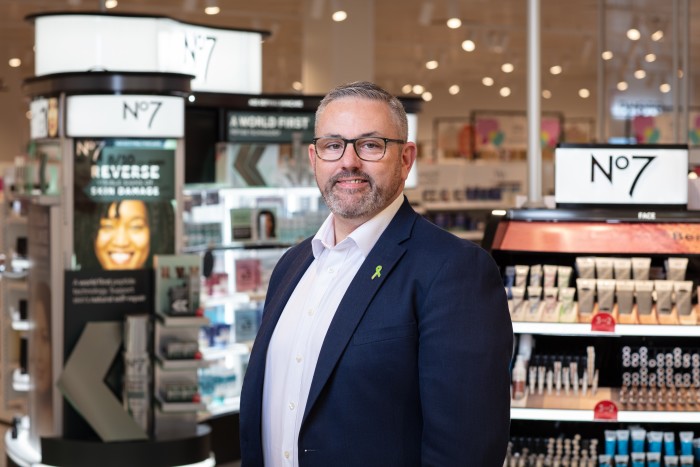Business schools target executives’ green gaps

Roula Khalaf, Editor of the FT, selects her favourite stories in this weekly newsletter.
When Shane McArdle studied finance and accounting at business school in the 1990s, there was little emphasis in the curriculum on the environmental, social and governance (ESG) issues that have since risen high up the corporate agenda.
The chief financial officer of health and beauty retailer Boots Ireland, McArdle wanted to become its finance champion for sustainability, and to bridge the gap between sustainability and business language. So, to deepen his knowledge and skills, he felt he needed to go back to school — specifically, to enrol on a specialist executive education course. Earlier this year, he signed up for Insead’s business sustainability programme.
“Climate change wasn’t a huge point 25 years ago,” McArdle recalls. “The world has entirely changed. It’s a tidal wave of movement towards responsible capitalism and sustainability, from an investor perspective.”
On the five-day programme, in Fontainebleau, near Paris, he developed the tools to measure, assess, report and communicate on sustainability, while also building a network of peers. “I already had a good understanding of the ‘what’ that needed to change, but the programme gave me the ‘why’ and the ‘how’,” he explains.
McArdle’s experience underlines how executive education is playing an important role in bringing up to date those business leaders whose degree programmes paid little heed to sustainability. For several decades, the business-school syllabus was shaped by the shareholder-primacy doctrine. That is changing, as issues such as climate change, purpose and values increasingly feature in MBA and other business degree courses.

The shift in emphasis has left “a massive gap in understanding what role companies play in the world” among some alumni, says Tom Lyon, the Dow professor of sustainable science, technology and commerce at the Ross School of Business and the School for Environment and Sustainability at the University of Michigan.
“People who graduated 20 to 30 years ago didn’t get the same training as people do today,” he says. “There really is some remedial education that’s needed.”
Where once business schools encountered tacit resistance from executives who viewed sustainability as a “softer” discipline, the appetite for such content is growing as companies have come under pressure to look beyond profit. Training providers are responding with new programmes that can help executives advance their organisation’s ESG initiatives.
Michigan: Ross will debut its new programme, “Building board expertise on sustainability”, in September. It targets directors of US corporations, who are facing competing forces. “On one hand, they have stakeholders who think companies are not doing enough for sustainability. The paradigm example is Engine No 1,” says Lyon. The hedge fund launched a proxy battle with ExxonMobil in 2021, nominating four directors to the oil company’s board and urging wholesale changes to its climate strategy.
“You also have lots of Republican politicians trying to punish companies that even think about ESG criteria, labelling them ‘woke capitalists’,” he adds. The new course will help boards understand their role in ESG oversight and present research that links sustainability with improved financial performance. It will also help directors speak out on contentious political and social issues.

The mantra of profit maximisation that once ruled on business-school syllabuses is often blamed for corporate wrongdoing. But, now, schools are keen to emphasise their role in training senior leaders who can powerfully shape corporate practice in positive ways.
“Executive education participants are the target group we want to motivate, because the decisions they make, the example they set, and the resources they allocate, can amplify the degree of change,” says Lawrence Loh, director of the Centre for Governance and Sustainability at NUS Business School in Singapore.
Loh says sustainability is evolving so rapidly that many business leaders are taking executive courses to keep pace. When NUS launched its short programme, Sustainability: the Next Challenge, last year, it expected to run the course once or twice annually. But such is the demand that the course is already on its eighth intake of participants.
In addition to standalone courses, schools are weaving ESG factors into broader management programmes, in a holistic approach to training.
“It’s very difficult to talk about leadership without talking about sustainability,” says Russell Miller, director of learning solutions and innovation at Imperial College Business School in London. “You just cannot separate it out from these core subjects anymore.”
What’s more, those modules are no longer looked down upon, adds Frank Brueck, who runs the Leadership Lab at the Leonardo Centre on Business for Society at Imperial. “If you have that in a programme, it’s not frowned upon any more. People realise this is something they need.”
Schools say their role is now less about winning hearts and minds and more about helping executives formulate and execute a sustainability strategy. “Organisations have come to appreciate this is no longer a box that needs to be ticked: it’s of strategic importance,” says Sameer Hasija, the dean of executive education at Insead.
Business-school academics, he adds, are having to quickly update their subject matter. “These topics are at the cutting edge of our frontier of knowledge,” he says, citing the scramble to create reporting standards for sustainable business.
However, Stuart Robinson, associate dean for business engagement, innovation and professional education at the University of Exeter Business School, questions whether business schools have the expertise to teach complex subjects such as climate change.
The UK school uses climate scientists from the University of Exeter to deliver executive education programmes. “We don’t want to behave as activists, but as scientifically informed institutions,” he stresses.
The bigger question is whether the lessons delivered in the business classroom are making a tangible difference in how the corporate sector behaves. “We need to start seeing people’s changing level of knowledge having an effect on what businesses do,” says Robinson. “We’re early in this process, but this is the next stage.”
Comments